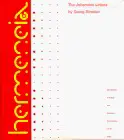

The Johannine Letters
in Hermeneia
Pages
319
Publisher
Fortress Press
Published
1996
ISBN-13
9780800660475
A scholarly treatment of the major literary, exegetical, and theological issues connected with the Johannine epistles, presented in a detailed and sustained fashion.
Collections
This book appears in the following featured collections.
- New Testament Commentaries & Monographs by Princeton Theological Seminary
- Recommended New Testament Commentaries for Evangelical Pastors by Thomas R. Schreiner
Reviews
Minneapolis: Fortress, 1996. Pp. xliv + 319, Cloth, $46.00, ISBN 0800660471. D. Moody Smith The Divinity School, Duke University Durham, NC 27708 The late George Strecker's Meyer (KEK) Commentary on the Johannine Letters (1989) has now appeared in English translation. Like its predecessor in that series, Rudolf Bultmann's commentary (1967; ET 1973), it becomes the Hermeneia Commentary on these three letters. Strecker's work is more than twice as long as Bultmann's and is a fuller, richer commentary. In its demonstrations of genuine erudition and technical competence it is a worthy successor in the tradition of the Kritisch-exegetischer Kommentar. Strecker's chief discussion partners, aside from Bultmann, are, appropriately, R. Brown and R. Schnackenburg; and there are frequent references to other twentieth-century commentators such as C. H. Dodd, S. Smalley, A. E. Brooke, and H. Windisch. Strecker expresses great respect for Bultmann, who was one of his first teachers of New Testament (p. xiii; but not his Doktorvater as the editorial note on p. vi erroneously indicates), and refers frequently to his commentary. Yet he disagrees on major issues of criticism and interpretation. For example, he frequently indicates his disagreement with Bultmann's source and redaction theories, which parallel the latter's proposals about the Gospel of John (e.g., pp. 6-7, 39). Few exegetes have actually agreed with Bultmann in this matter; so Strecker's demurral is scarcely original, although I think it entirely warranted. Moreover, Strecker is also wisely reluctant to embrace a pre-Christian gnosticism as an important component of the milieu of the Johannine literature despite the antidocetic position of 1 John (pp. 26-27).
[Full Review]


